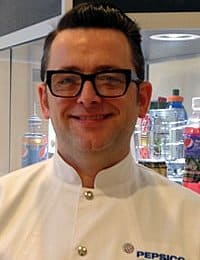
CIA Alumni Bio
Culinary arts, nutrition, and food science are coming together in ways that help innovative chefs create more flavorful, healthful, and delicious foods. Today, these chefs are found not only in the kitchens of the most cutting-edge restaurants, but also in the research kitchens of leading food companies.
Home Cooking
PepsiCo Corporate Executive Research Chef Kyle Shadix is one of these chefs. His obsession with food and its effects on the body can be traced back to the day he was born. Kyle’s undiagnosed soy allergy caused him to become very familiar with food labels, claims, and ingredients in his search for answers. “Luckily, I come from a family who loved to cook. We didn’t go out to restaurants because my mom’s cooking was so much better,” says Kyle. “And my dad loved to garden; he was doing farm-to-table long before local became popular. I noticed that when we cooked from scratch, I never had any adverse allergic reactions since we never grew edamame.”
His desire to enter the nutrition field logically stemmed from this personal struggle, as well as from a sincere love of cooking and the natural sciences. Kyle’s high school home economics teacher talked to him about potential career paths, mentioning culinary arts, nutrition, or food science. Kyle decided that he wanted all three.
The CIA Advantage
He graduated from the University of Georgia with a BS in consumer foods and nutrition & food science, with a minor in French. While studying in France as an exchange student Kyle realized that he wanted to attend The Culinary Institute of America, where he subsequently earned a degree in baking and pastry arts. “The CIA was and still is the Ivy League of culinary schools, and I always wanted to be taught by the crème de la crème,” Kyle says. “It opened doors for me in so many ways, and not just from a jobs perspective. Third-party credibility goes a long way in the food industry, and having a degree from the CIA gave me opportunities I would have never had otherwise. I am convinced that the deciding factor in my receiving a teaching fellowship at NYU was in large part because I attended the CIA.”
Special Tailored Meals
While pursuing his MS in clinical nutrition at New York University, Kyle completed his dietetic internship at Mount Sinai Medical Center, and simultaneously served as a consultant at Memorial Sloan-Kettering Cancer Center. His CIA education played an integral role in his plan to create a more personalized and appealing dining experience for the Center’s patients. “It’s especially important for cancer patients to have beautiful food that is artfully presented; food they’ll want to eat,” says Kyle. “We established the core ‘restaurant style’ menu, then tailored the meals based on more than 90 disease states. For example, for those on a puréed diet, we used every trick in the book to make the food brighter and more appealing, including mouth-watering descriptions and appropriate service ware. I’ll never forget how we poured Ensure® into an ice cream machine and topped the ice cream with chocolate syrup, whipped cream, and a cherry to make parlor-style sundaes. Retooling the menu to increase calorie consumption for a seriously ill person can go a long way in improving their enjoyment of a meal and, ultimately, their overall health.”
Because Kyle is such a big proponent of education, he was excited to hear about the CIA’s new culinary science bachelor’s degree, which he calls “the ultimate career path.”
School is so Important
“These days, it’s so important to go to school,” he says. “Not only do you learn social and critical-thinking skills, the practical, hands-on experience gained in culinary school reinforces how the foundations of food production can prepare a person for an exciting career.” Kyle has certainly had a thrilling career, especially in his current position at PepsiCo Global R&D, where he says there’s no such thing as a typical day. “I lead culinary innovation for the beverage business, support product development teams, and work with flavor houses,” he says. “I also work closely with sensory and consumer sciences and consumer insights on new product development methodologies for any number of our global beverage brands.” In a company with net revenues of more than $65 billion and a product portfolio that includes 22 brands generating more than $1 billion each in annual retail sales, “There is no such thing as dull or boring; every day is an opportunity to discover something exciting and new.”
Chef Kyle Shadix majored in baking and pastry arts at The Culinary Institute of America in Hyde Park, NY. He the corporate executive research chef, food scientist, and the director of new product development and innovation at PepsiCo in Purchase, NY.